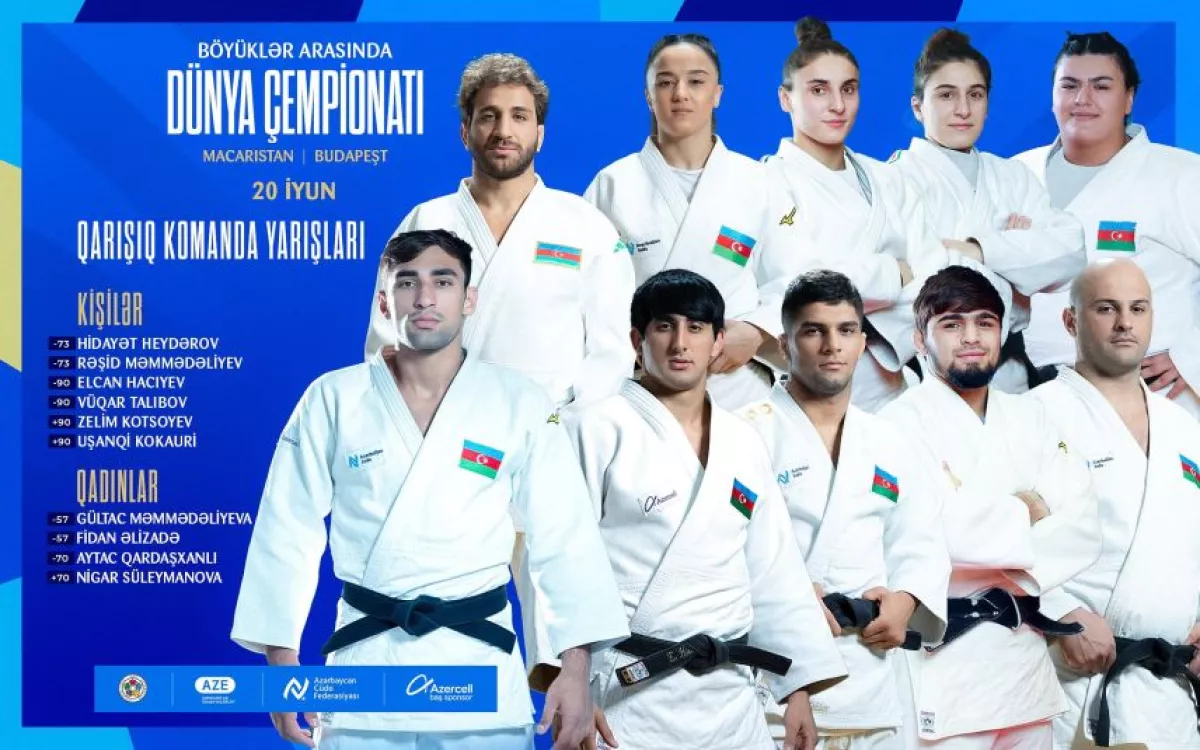What happened to Azerbaijan’s judo powerhouse? Failure in Budapest
The recent gathering of nearly six hundred of the world’s top judokas in Budapest has come to an end, where the strongest — the winners of 15 gold medals — were crowned. To the great disappointment of domestic judo fans, none of these champions represented Azerbaijan.
“After all, we only have three world champions in our entire history!” some judo experts might argue, and they wouldn’t be entirely wrong. Indeed, two of our judokas — Hidayat Heydarov and Zelym Kotsoiev — claimed world titles 11 years after our first champion, now national team coach Elkhan Mamedov. Those same athletes later went on to become Olympic champions, elevating Azerbaijani judo to a new level.
Yet now, just a year later, we have slipped back to a more familiar reality — winning only a couple or three bronze medals at the world championships, with gold once again out of reach.
So, as painful as it may be, Budapest reminded us of our true standing, after just a year of being counted among the top three judo powers. What changed in such a short time? Why did neither the European Championship — where in 2024 we secured two golds and a silver — nor this year’s World Championship allow us to even maintain our position, let alone improve it? Why did Japan, Russia, and even Georgia hold firm in their dominance, while we slipped back?
Let’s begin with our biggest golden hopes — Hidayat Heydarov (73 kg) and Zelym Kotsoiev (100 kg). Everyone seemed eager to criticize Heydarov, except perhaps the laziest observers. But the coaching staff also deserve scrutiny. Considering Heydarov had not competed for nearly 10 months after his Olympic triumph, they might have entered him in the under-81 kg category instead. After all, 80–82 kg has been Heydarov’s “working weight” for the past five or six years, and following such a long break, his weight naturally increased by a couple of kilograms.
Even if you are a three-time Olympic champion, dropping 11–12 kilograms in just a few days while maintaining peak fighting form is simply unrealistic. To reach 73 kg, Heydarov always has to cut significant weight. Before the Tokyo Olympics, there was an attempt to move him to the under-81 kg category — at least to avoid losing such an exceptionally talented judoka on the Olympic stage. For context, Rustam Orujov, who competed successfully in the under-73 kg category, won silver at the 2016 Olympics.
I believe Heydarov — known not only for his excellent physical condition but also for a good appetite and occasional lapses in discipline — could be moved to the under-81 kg category after the World Championship. There, he would face fierce competition from Zelym Kotsoiev, who won’t let him rest — much like he once pushed out the equally accomplished Said Mollaei, effectively forcing him out of the national team.

The judoka who never lets his guard down is the team’s most disciplined member — Zelym Kotsoiev. His consistency earned him a silver medal at the European Championships and bronze at the World Championships, helping him retain his top position in the world rankings.
But what about the rest? Eljan Hajiyev certainly showed promise, yet bronze is still not gold — despite pre-championship talk that he might become another world champion for our team.
Medals were expected from nearly all seven of our judokas — or at least, that’s what the federation’s executive vice-president Rashad Rasullu often insists (author’s note). Yet fewer than half delivered, with only three athletes reaching the podium. Even among those, Hajiyev and Kotsoiev fell short of the expectations placed on them.
The World Championship demonstrated that neither Ahmad Yusifov (60 kg) nor Ruslan Pashayev (66 kg) are yet ready to claim major victories; their current peak seems limited to winning occasional “Grand Slam” events. However, even their defeats pale in comparison to the seemingly endless failures of Ushangi Kokauri, who consistently loses to any Georgian judoka at any stage of any tournament.
I understand that Ushangi is still stronger than any of our homegrown heavyweights today. But, damn it, let our hypothetical Mammad lose to some hypothetical Georgian. Let him gain experience, rather than be repeatedly and ingloriously overshadowed by Kokauri — who never truly became “one of ours,” never won any titles, and didn’t even learn the language. As they say, nothing personal — just patriotism. The kind of patriotism Kokauri clearly still has — but only toward Georgia.
Otherwise, why would the head coach of the women’s team be replaced by the French coach Amina Abdullatif, under whose leadership the team performed even worse than before? And this is despite the fact that the former head coach, Rashad Mammadov, almost immediately took over the Iranian women’s team.
And finally… While it’s hard to fault Richard Trautmann — the head coach of the men’s national team — as much as Amina Abdullatif, not least because he delivers results, there remain serious questions. Why does he send our Azerbaijani- and Russian-speaking athletes onto the tatami during critical matches without speaking a word of either language? What tactical advice can he realistically give during bouts? How can he genuinely motivate and encourage them just before stepping onto the mat?
The team is fortunate to have excellent assistants, led by the legendary Elkhan Mammadov, who enjoys strong relationships with every judoka. Or am I mistaken? Since the first World Championship under Trautmann’s leadership in 2022, I have yet to receive a clear answer from our Federation.
Vugar Vugarli, exclusively for Caliber.Az








